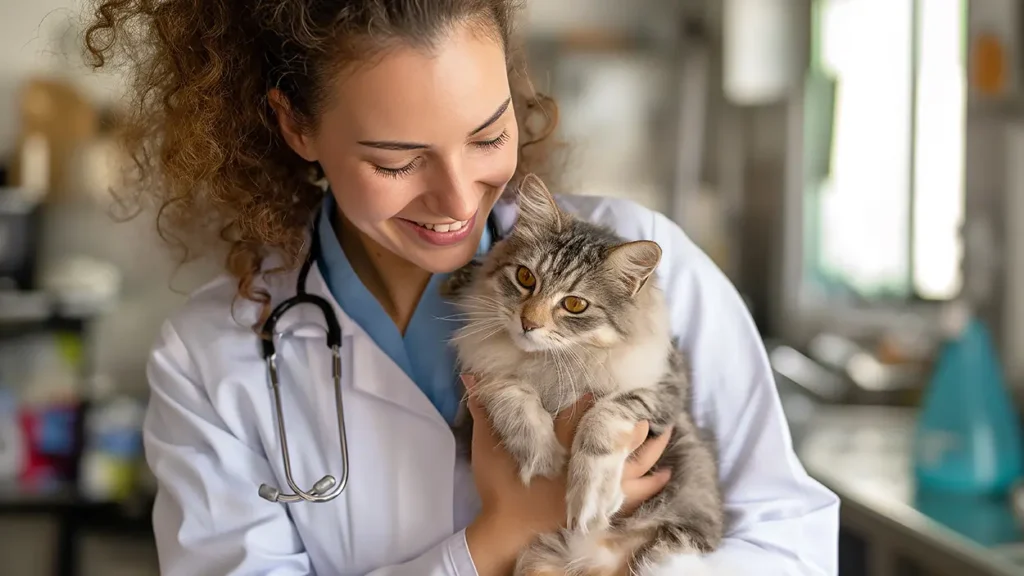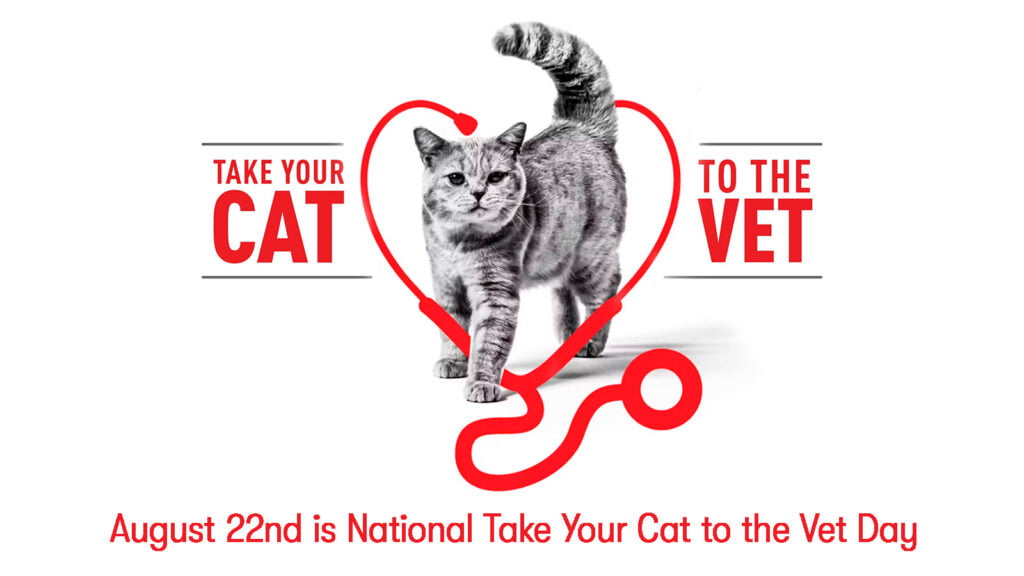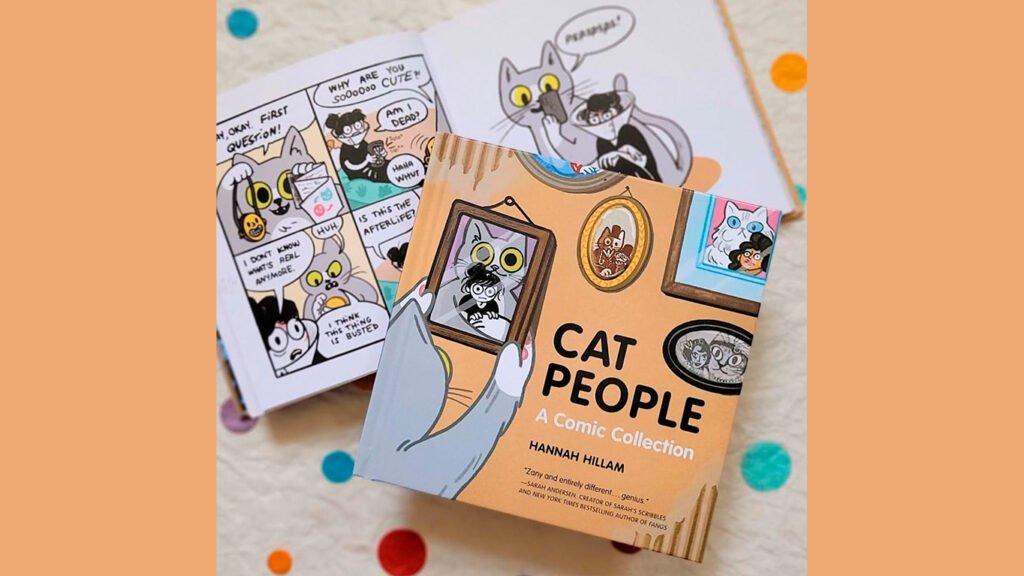National Take Your Cat to the Vet Day 2025: Conquering Anxiety and Busting Myths

August 22, 2025 is National Take Your Cat to the Vet Day
Sarah Martinez, DVM checked her appointment schedule as she sipped her morning coffee. Five long overdue appointments with cats today – the kind that made her both hopeful and concerned. Her phone buzzed with a notification: CALENDAR – National Take Your Cat to the Vet Day – All day. She smiled wryly. Maybe people do read those newsletters we send out, she thought.
Twenty minutes away, Emma stared at her buzzing phone: CALENDAR – Milo’s Vet Visit With Dr. Martinez – Today at 9:00 am. Her stomach dropped. Perched on his favorite chair near the window, Milo’s ear twitched – sensing his human’s stress. His amber eyes opened, meeting Emma’s worried gaze.
Dr. Martinez had seen it countless times: anxious cat parents, stressed cats picking up every emotion. But today felt different.
“We’re in this together, boy,” Emma whispered to Milo. She took a deep breath and grabbed his carrier. Time to face the music.
This familiar scenario – worried pet owners and the veterinarians determined to help them – plays out in communities across America every day. But new research reveals we’re making real progress while still fighting dangerous misconceptions that put millions of cats at risk. On this National Take Your Cat to the Vet Day 2025, we’re not just addressing the “pre-vet scaries” – we’ll debunk some myths that keep our feline friends from getting the care they desperately need.
The Good News: Cat Care Is Improving
A recent survey by Royal Canin found that frequency of wellness visits at least once a year are up from 2023, showing that more cat parents are recognizing the value of preventive care. Veterinary care spending has jumped roughly 111% since 2018, demonstrating unprecedented investment in pet health.
But here’s the sobering reality: about half of cat owners surveyed (51%) still believe cats are naturally self-sufficient and don’t need much medical care. This myth isn’t just wrong – it’s potentially deadly.
The Dangerous Myths That Need to Die
Myth #1: “Cats Are Self-Sufficient and Don’t Need Medical Care”
The Reality: Only about 44% of cat owners take their felines to the vet annually, compared to much higher rates for dogs. Nearly all cat owners (94%) agree that early veterinary care is important for a cat’s long-term health and wellbeing, but 2 in 5 (41%) only feel it’s only necessary to take their cat to the vet when they’re a kitten.
Myth #2: “Indoor Cats Don’t Need Regular Vet Visits”
The Reality: Indoor cats can still suffer from obesity, dental disease, and parasites. Age-related conditions like kidney disease, diabetes, and arthritis don’t discriminate based on whether your cat ventures outdoors.
Myth #3: “I’ll Know When My Cat Is Sick”
The Reality: Cats are masters at masking discomfort. Whether it’s arthritis, dental pain, kidney issues or silent infections, many common conditions go untreated because early signs are so subtle. Felines typically hide signs of illness as long as possible—it’s a survival instinct.
The Stakes Are Higher Than Ever
The cost of waiting until something’s wrong has never been higher. Vet care costs are on a steady upward path, rising 6.4% from June 2023 to June 2024. The average emergency vet visit costs a cat owner $154 while routine vet visits cost cat owners an average of $182 per year.
The math is simple: Preventive care costs a fraction of emergency treatment, and early detection can literally save your cat’s life.
What’s Actually Happening During That Vet Visit
Many cat parents avoid vet visits because they don’t understand their value. A veterinary physical exam can reveal abnormalities you can’t detect at home. In many cases, health issues can be found during the examination before they become serious.
Here are some things your vet is commonly checking:
- Heart and lung function through careful auscultation
- Early signs of kidney disease through palpation and potentially blood work
- Dental health – only 45% of cat owners in the UK brush their cat’s teeth or provide dental checks at home
- Weight management to prevent obesity-related complications
- Age-appropriate care – cats over the age of 7 are more likely to develop chronic conditions and benefit most from regular check-ups
Conquering the “Pre-Vet Scaries”
The anxiety is real, but it’s manageable. Here are some top strategies to consider this year:
- Carrier Transformation
Don’t just leave the carrier out – make it a “cat cave of awesome.” Add their favorite blanket, treats, and even feed them meals inside it for weeks before the appointment. - Pheromone Power-Up
Try spraying pheromone spray in your cat’s carrier, on a favorite blanket and in the car around 30 minutes before leaving for the vet appointment. These synthetic calming pheromones can significantly reduce stress. - Strategic Scheduling
Book appointments during off-peak hours when the waiting room is quieter. Many clinics now offer “cat-only” appointment times or will let you wait in your car until your appointment. - Practice Runs
Take short car rides that don’t end at the vet. Make car travel a normal, positive experience. - Stay Zen
When you feel stressed, cats can sense negative energy, too. Your calm energy directly impacts your cat’s stress level.
The Financial Reality: Making Vet Care Accessible
Cost concerns are legitimate. Studies have found that 38% of households responding to surveys have gone into debt in order to cover the cost of pet related medical care. But there are solutions:
- Pet insurance is growing rapidly – the number of insured cats and dogs in the U.S. grew by 126 percent from 2019 to 2023
- Wellness plans offered by many veterinary practices
- CareCredit and other veterinary financing options
- Community resources and low-cost clinic programs
Special Considerations for Senior Cats
The American Animal Hospital Association (AAHA) and American Association of Feline Practitioners (AAFP) collaborated to create the Feline Life Stage Guidelines that say adult cats should be examined at least once a year and senior cats (age 10 and up) should visit the vet every six months. Senior cats need extra vigilance because:
- Age-related diseases become more common
- Weight gain or subtle behavior changes are often the first signs something isn’t right
- Early intervention can dramatically improve quality of life
Taking Action Beyond the Vet Visit
National Take Your Cat to the Vet Day isn’t just about scheduling one appointment – it’s about becoming an informed advocate for your cat’s health:
- Keep a health journal tracking eating, drinking, litter box habits, and behavior changes
- Learn the subtle signs of pain and illness in cats
- Build a relationship with your veterinary team
- Stay informed about feline health developments
The Bottom Line: Your Cat Is Counting on You
Racquel White, vice president of corporate affairs, Royal Canin North America, said: “While cats are important parts of owners’ lives and families, misconceptions about the level of care needed impacts our conversations around feline health and the priority of routine veterinary appointments”.
The truth is simple: Cats aren’t self-sufficient when it comes to healthcare. They’re masters at hiding pain and illness, which makes them completely dependent on us to ensure they get the preventive care they need.
This National Take Your Cat to the Vet Day, let’s commit to being the advocates our cats deserve. Schedule that appointment, ask those questions, and remember – a little “pre-vet scary” anxiety is a small price to pay for the peace of mind that comes with knowing your feline family member is healthy and protected.
Your cat may not thank you for the vet visit, but their health – and your bond – certainly will.
Ready to take action? Visit Royal Canin’s Cat2Vet resource page for helpful tips. Visit the Pawzhub Directory to find a veterinarian near you. And remember – every small step toward better feline healthcare makes a difference in the life of a cat who depends on you completely.




Responses